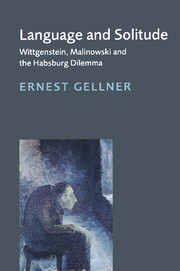Book contents
- Frontmatter
- Contents
- Preface
- Foreword
- Part I The Habsburg dilemma
- 1 Swing alone or swing together
- 2 The rivals
- 3 Genesis of the individualist vision
- 4 The metaphysics of romanticism
- 5 Romanticism and the basis of nationalism
- 6 Individualism and holism in society
- 7 Crisis in Kakania
- 8 Pariah liberalism
- 9 Recapitulation
- Part II Wittgenstein
- Part III Malinowski
- Part IV Influences
- Part V Conclusions
- General bibliography
- Bibliographies of Ernest Gellner's writings on Wittgenstein, Malinowski, and nationalism
- Index
5 - Romanticism and the basis of nationalism
Published online by Cambridge University Press: 05 March 2010
- Frontmatter
- Contents
- Preface
- Foreword
- Part I The Habsburg dilemma
- 1 Swing alone or swing together
- 2 The rivals
- 3 Genesis of the individualist vision
- 4 The metaphysics of romanticism
- 5 Romanticism and the basis of nationalism
- 6 Individualism and holism in society
- 7 Crisis in Kakania
- 8 Pariah liberalism
- 9 Recapitulation
- Part II Wittgenstein
- Part III Malinowski
- Part IV Influences
- Part V Conclusions
- General bibliography
- Bibliographies of Ernest Gellner's writings on Wittgenstein, Malinowski, and nationalism
- Index
Summary
The universalistic-atomic and the romantic-organic vision are indeed the two great rivals, the poles of a fundamental binary opposition. Much of the intellectual life of recent times can be spelt out in these terms. However, the two visions do not exhaust the world. (As we shall see, the contrary supposition, that there is no further option, can be a terrible mistake.) Other options are in fact available. Other forces are in operation. The polarity which concerns us might never have become quite so conspicuous, had not one further vision entered the scene: nationalism.
The traditional organic way of life is probably imperceptible to itself. It is lived, it is danced, it is performed in ritual and celebrated in legend, but it is hardly articulated in theory. It is only when the snake of abstract theory appears in the garden, that the garden is suddenly perceived and named Community. Only then does one begin to sing its praises. The real traditionalist, al-Ghazzali observed, does not know himself to be such. Community is sung and praised by those who have lost it.
Even when an Enlightenment castigates tradition for its arbritrariness, cruelty, and injustice, tradition does not initially defend itself as tradition. The first reactionaries tend to be absolutists. They defend their tradition because they consider it to be revealed and valid. They use a language similar to that of their critics. Or one might put this the other way round: just because the ‘higher’ religions already used theories with universalist pretensions, they prepared the ground for their eventual opponents. By giving reasons at all, they implicitly invited their critics to challenge them with better reasons.
- Type
- Chapter
- Information
- Language and SolitudeWittgenstein, Malinowski and the Habsburg Dilemma, pp. 21 - 25Publisher: Cambridge University PressPrint publication year: 1998
- 1
- Cited by



